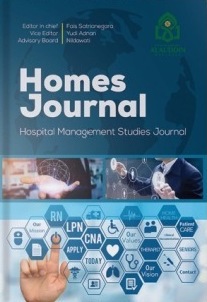MOTHER KNOWLEDGE OF NUTRITION AND EFFECT ON NUTRITIONAL STATUS OF CHILDREN IN COMMUNITY HEALTH CENTER
Abstract
Background:The level of nutritional knowledge from a mother will affect a person in the decision to provide a child's intake, so it will automatically affect the nutritional status of the child. Good knowledge is expected that children will get good nutrition so that children's growth is in accordance with the age of growth and development. Good knowledge of mothers will look to provide or prepare daily food in an amount sufficient for the nutritional needs of the child.
Objective:The purpose of this study was to determine the effect of maternal knowledge on nutrition on the nutritional status of toddlers at Puskesmas Harapan Raya Pekanbaru.
Method: Thistype of research is observational analytic, with aapproach design cross sectional. The study population was all mothers who have children under five at Puskesmas Harapan Raya Pekanbaru. The research sample consisted of 35 respondents using purposive random sampling technique. The research instrument used a questionnaire to measure the level of knowledge of the nutritional status of toddlers using parameters of body weight / height based on the Z score category. The results of the measurement of research data were then carried out by testing the hypothesis by using the Chi-Square test
Result:The results showed that from the results of the hypothesis test the effect of the level of maternal knowledge about nutrition on the nutritional status of toddlers, the value of p = 0.001 (p> 0.05) was obtained, so that Ho was rejected, which means that there was an effect of the level of mother's knowledge about nutrition on the nutritional status of toddlers. With OR: 14.7 with 95% CI: 2.31-93.44.
Conclusion : The level of mother's knowledge affects the nutritional status of children under five. The magnitude of the influence of a high level of maternal knowledge is 14.7 x fold compared to mothers with low knowledge.
References
Adisasmito, Agung. 2007. Pengantar Pangan Dan Gizi. Jakarta: Penebar Swadaya.
Afriansyah, A. (Adam), and R. (Rizka) Fikrinnisa. 2018. “Pengetahuan Dan Sikap Ibu Tentang Pencegahan Gizi Kurang Pada Balita Di Puskesmas Paal V Kota Jambi Tahun 2015.” Scientia Journal 7(2):160–66.
Depkes. 2005. Klasifikasi Status Gizi Anak Bawah Lima Tahun (BALITA). jakarta: Direktorat Jendral Bina Kesehatan Masyarakat.
Febry, A,Pujiastuti, N, Fajar, I. 2013. Ilmu Gizi Untuk Praktisi Kesehatan. Yogyakarta: Graha Ilmu.
Gupta, R., Chakrabarti, S., Chatterjee, S. G. 2016. “A Study to Evaluate the Effect of Various Maternal Factors on the Nutritional Status of Under-Five Children.” Indian Journal of Nutrition 3(2):149.
Hermawati, N. Ayu Gustia, Y. Debi. 2018. “Faktor– Faktor Yang Berhubungan Dengan Status Gizi Anak Balita Di Wilayah Kerja Puskesmas Dadok Tunggal Hitam Tahun 2019.” Jurnal Kesehatan Saintika Meditory Jurnal Kesehatan Saintika Meditory 1(August):79–88.
Istiono, Wahyu, Heni Suryadi, Muhammad Haris, Irnizarifka, Andre Damardana Tahitoe, M. Adrian Hasdianda, Tika Fitria, and T. .. Riris Sidabutar. 2009. “Analisis Faktor-Faktor Yang Mempengaruhi Status Gizi Balita.” Jurnal Ilmu Kesehatan Masyarakat 25(3):150–55.
Mahardika, S. 2016. “Hubungan Pengetahuan Ibu Tentang Gizi Dan Tingkat Kehadiran Anak Balita Di Posyandu Dengan Status Gizi Anak Balita Di Desa Gedongan ….” Core.Ac.Uk.
Masithah, T. 2005. “Ubungan Pola Asuh Makan Dan Kesehatan Dengan Status Gizi Anak Batita Di Desa Mulya Harja.” Jurnal Gizi Dan Pangan 34(1):39–49.
Notoatmodjo. 2012. Promosi Kesehatan Dan Perilaku Kesehatan. Jakarta: Rineka cipta.
Panambunan W, Sjane H. 2006. “Pola Makan Terhadap Status Gizi Balita Di Desa Blimbing Kecamatan Sambirejo Kabupaten Sragen.” Jurnal Penelitian Gizi Dan Makanan 48(11):69–78.
Putri, Rona Firmana, Delmi Sulastri, and Yuniar Lestari. 2015. “Faktor-Faktor Yang Berhubungan Dengan Status Gizi Anak Balita Di Wilayah Kerja Puskesmas Nanggalo Padang.” Jurnal Kesehatan Andalas 4(1):254–61.
Rahmawati, Ira, Toto Sudargo, and Ira Pramastri. 2007. “Pengaruh Penyuluhan Dengan Media Audio Visual Terhadap Peningkatan Pengetahuan, Sikap Dan Perilaku Ibu Balita Gzi Kurang Dan Buruk Di Kabupaten Kotawaringin Barat Propinsi Kalimanan Tengah.” Jurnal Gizi Klinik Indonesia 4(2):67–77.
Riyadi, Hadi, Drajat Martianto, Dwi Hastuti, Evy Damayanthi, and Kukuh Murtilaksono. 2011. “Faktor-Faktor Yang Mempengaruhi Status Gizi Anak Balita Di Kabupaten Timor Tengah Utara, Provinsi Nusa Tenggara Timur.” Jurnal Gizi Dan Pangan 6(1):66.
Rona Firmana Putri, Delmi Sulastri, Yuniar Lestari. 2015. “Faktor-Faktor Yang Berhubungan Dengan Status Gizi Anak Balita Di Wilayah Kerja Puskesmas Nanggalo Padang.” Jurnal Kesehatan Andalas 4(1).
Santoso. 2004. Kesehatan Dan Gizi. Cetakan Ke. Jakarta: PT. Asdi Mahasatya.
Shoewu, O., D. Ph, O. A. Idowu, B. Sc, S. S. Tenuche, B. Elisha, M. A. Umar, B. I. Ahmad, A. A. Sambo, Tabassam Nawaz, Saim Pervaiz, Arash Korrani, A. Ahmed, O. M. Olaniyi, J. G. Kolo, C. Durugo, and Bhrigu K Lahkar. 2016. “Faktor-Faktor Yang Berhubungan Dengan Status Gizi Pada Anak Balita Di Wilayah Kerja Puskesmas Bontomarannu.” CEUR Workshop Proceedings 13(1):315–22.
Sunita, Almatsier. 2010. Perinsip Dasar Ilmu Gizi,. jakarta: PT Gramedia Utama.
Supariasa, I.D.M., Bakri, B., & Fajar, I. 2016. Penilaian Status Gizi. jakarta: Buku Kedokteran EGC.
Suryani, Linda. 2017. “Faktor Yang Mempengaruhi Status Gizi Balita Di Wilayah Kerja Puskesmas Payung Sekaki Pekanbaru.” Journal Of Midwifery Science 1(2):47–53.
Woge, Yoseph and, Toto Sudargo. 2017. “Faktor-Faktor Yang Berhubngan Dengan Status Gizi Anak Balita Di Kecamatan Kelimutu Kabupaten Ende Flores Provinsi Nusa Tenggara Timur.” Jurnal Gizi Klinik Indonesia. 1(3):92–94.


